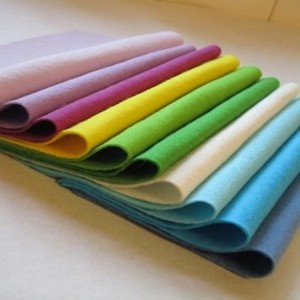Modern agriculture is constantly evolving, and polyester felt is emerging as a revolutionary material that is providing innovative solutions to various challenges faced by the farming industry. From crop protection to water management, polyester felt is playing a vital role in enhancing agricultural productivity and sustainability.
In crop protection, polyester felt is widely used for creating protective covers and barriers. Frost protection is a significant concern for farmers, especially during the early spring and late autumn seasons. Polyester felt covers can be used to shield crops from cold temperatures, preventing frost damage and extending the growing season. These covers allow sunlight and moisture to penetrate while providing a thermal barrier, creating a microclimate that is more favorable for plant growth. Additionally, polyester felt can be used to protect crops from pests and birds. Insect – proof polyester felt netting can be installed over crops, preventing pests from reaching the plants and reducing the need for chemical pesticides.
Water management is another area where polyester felt is making a difference. In irrigation systems, polyester felt can be used as a filter material to remove impurities from water sources. This ensures that the water used for irrigation is clean and free from sediment, debris, and harmful substances, preventing damage to irrigation equipment and promoting healthy plant growth. Moreover, polyester felt can be used in rainwater harvesting systems. It can be used to filter and store rainwater, providing a sustainable source of water for agricultural use. The material’s ability to retain moisture also makes it useful in soil moisture conservation. Polyester felt mulch can be applied to the soil surface, reducing evaporation and maintaining soil moisture levels, which is particularly beneficial in arid and semi – arid regions.
In greenhouse farming, polyester felt is used for various purposes. It can be used as a thermal insulation material to regulate the temperature inside the greenhouse, ensuring optimal growing conditions for plants throughout the year. Polyester felt curtains can be installed to provide shade during hot summer days, preventing plants from overheating. Additionally, polyester felt can be used for creating partitions within the greenhouse, allowing for better organization and management of different crops.
The use of polyester felt in agriculture also contributes to sustainable farming practices. Recycled polyester felt can be used in agricultural applications, reducing the environmental impact of the farming industry. By reusing materials, farmers can save resources and minimize waste. Moreover, the durability of polyester felt means that it can be used for multiple growing seasons, providing long – term value and cost – effectiveness.
As the global demand for food continues to increase, the role of polyester felt in modern agriculture will become even more important. With ongoing research and development, new applications and improved products based on polyester felt are likely to emerge, further transforming the agricultural landscape and promoting sustainable farming practices.

Post time: Jun-03-2025
